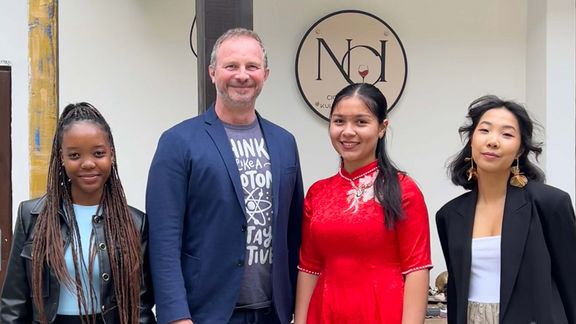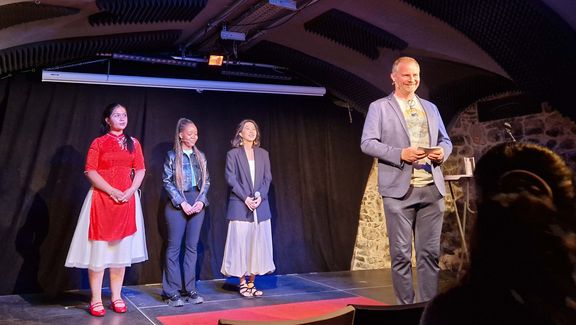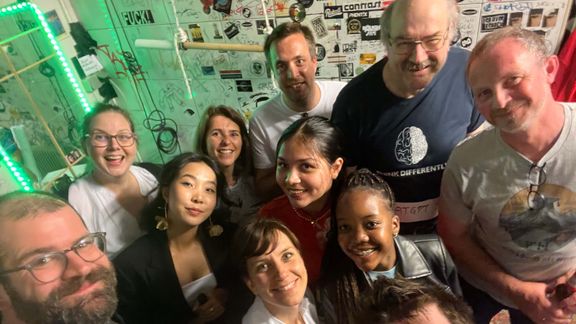In front of an almost full house, the eleven speakers presented six pitches explaining their research area in an entertaining and accessible way. Each competitor had six minutes to inspire a very diverse audience, composed of pupils from various schools in Villach, students and staff members of CUAS, as well as sponsors and curious citizens/neighbours. Topics included multilingualism, social behavior and innovation through games (full list below), and the audience was even put to contribution a few times.
Embracing the internationality of the evening, the slams were delivered in German, English or even several languages at once. This was actually the basis of the contribution from the team coming from our School of Management: Devin Majilana, Alina Pak and Hilde Thi Phuong Schweiger, three Intercultural Management students coming from Zimbabwe, Kazakhstan and Vietnam, respectively. Accompanied by Dr. Colin Heller, co-director of the programme and coordinator of CUAS’ Language Center, they took to the stage to raise the question: “Sprachenvielfalt: Bringen wir die Welt nach Villach?” / "Linguistic diversity: Are we bringing the world to Villach?". Together, they shone with their linguistic diversity and highlighted the complexity of intercultural dimensions. Ten languages were spoken in only six minutes, many of them unknown from the audience. And yet, the message was received loud and clear: language and culture diversity are precious and should be seen an enrichment for our universities and regions, with all its challenges.
Alina reflected on her participation in the Science Slam and how she could channel her lived experience to share it with the audience:
“I want to share with you an amazing journey I experienced at the International Science Slam. It wasn't just about discussing scientific ideas it was an immersion into the world of multilingualism, cultural diversity, and the search for my own identity.
From my earliest childhood, I have been pondering questions about who I am and where I belong. Born in Kazakhstan and raised in the culture of my Korean ancestors, I speak Russian. Sometimes it feels as if my various cultural heritages are in a struggle inside me for dominance. But over time, I have come to realize that it is precisely this harmony of differences that makes me whole.
One of the most thrilling moments of my performance was the decision to speak a few words in Kazakh. Even though Russian is my first language, I felt it was important to respect and highlight the complex history of Kazakh culture.”
The evening was an entertaining and enriching experience for everyone involved, as science has never been so much fun for many. Research enthusiasts can rejoice: the second edition of the International Science Slam is already being planned!
Full list of pitches (in running order):
- (Warm up – off-competition) “ATHENA European University: Die Zukunft von Lehre und Lernen an unseren Universitäten” / “ATHENA European University: The future of teaching and learning at our universities”
Saša Grašič (University of Maribor), Melissa Pebayle & Julia Marinaccio (CUAS) - WINNER “Von Vertrauen und Kontrolle in der medizinischen Bildgebung” / "Trust and control in medical imaging"
Viktoria Scariano & Matthias Woltsche (CUAS) - “The Warrior's Dilemma in Saving the World through Social Behaviour”
Marisa R. Ferreira (Polytechnic Institute of Porto) - “Sie will doch nur spielen… ???? oder: Warum wir spielerisch sein müssen, um innovativ zu sein” / “She just wants to play... ???? or: Why we have to be playful to be innovative”
Gloria Bottaro (independent researcher, Carinthia) - “Der Gesang des O'o - Biogeografie und Klanglandschaftsökologie” / "The Song of the O'o – Biogeography and Soundscape Ecology"
Lukas Hutter (BG/BRG Villach St. Martin) - “Crafting a Better Future with AI: Where 'Oops' Doesn't Mean 'Skynet Activated”
Jani Dugonik & Domen Verber (University of Maribor) - “Sprachenvielfalt: Bringen wir die Welt nach Villach?” / "Linguistic diversity: Are we bringing the world to Villach?”
Devin Majilana, Alina Pak, Hilde Thi Phuong Schweiger & Colin Heller (CUAS)



